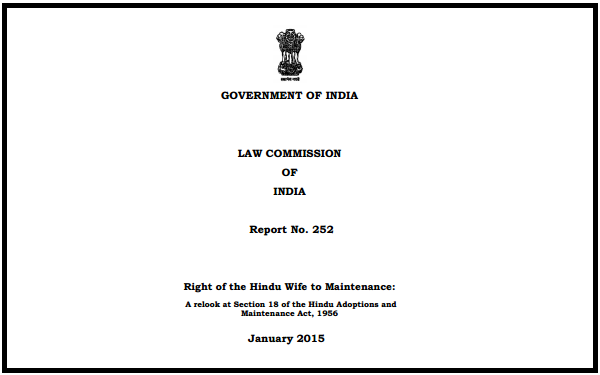Under Section 18 of the Hindu Adoptions and Maintenance Act, 1956, the wife has a right to be maintained by her husband during her lifetime. Likewise, Section 19 of the said Act provides to a widowed daughter-in-law the right to claim maintenance from her father-in-law. However, there are situations when the husband is alive but incapable to maintain the wife (due to physical or mental incapacity, for example), in such situations, under the Hindu Adoptions and Maintenance Act, the wife of such a person does not enjoy such right to maintenance against the relatives of the husband even if the husband is a member of a joint family. Now, the Law Commission of India, in its Report No. 252, sent to Mr. D.V. Sadananda Gowda, Union Law Minister, Government of India, vide letter dated 6 January 2015, recommended to amend the law to provide for such right to a wife to claim maintenance from the joint family of the husband.

The Law Commission has noted that in a decision given by the High Court of Punjab and Haryana in the case of Avtar Singh vs. Jasbir Singh, RSA No. 29/1988 (O&M), decision dated 11.02.2014, a lacuna (as mentioned above) in the position of a Hindu wife qua her property and maintenance rights under the existing law was identified. Following observations were made by the High Court in the said case:
“Before parting with judgment, it would be appropriate to mention that no provision has been brought to my notice by learned counsel for the parties that if husband is insane or of unsound mind, the daughter in law who is not having any source of maintenance can claim maintenance for herself. When she has to maintain her mentally ill husband, her condition is worse than being a widowed daughter in law. In such a situation, the wife should be deemed to be dependent upon the father in law and entitled to maintenance as provided under Section 19 of the Hindu Adoptions and Maintenance Act.
Copy of this Order be sent to the Union Ministry of Law and Justice and Law Commission of India for taking appropriate measures for amendment in the Act.”
On the basis of this judgment, Commission formed a Committee for this purpose comprising of the Mr. Justice (Retd.) Ajit Prakash Shah, Chairman, Law Commission of India; Justice (Retd.) Ms. Usha Mehra, Member, Law Commission of India; Ms. Dipika Jain, Associate Professor, Jindal Global University, Sonepat; and Mr. Saptarishi Mandal, Assistant Professor, Jindal Global University, Sonepat.
On the basis of the study conducted by this Committee, the Law Commission has now submitted is Report No. 252 to the Government of India with a recommendation to amend the Hindu Adoptions and Maintenance Act, 1956, insertion of sub-section 4 under Section 18 of the said Act as below:
“Section 18 (4) – Where the husband is unable to provide for his wife, on account of physical disability, mental disorder, disappearance, renunciation of the world by entering any religious order or other similar reasons, the Hindu wife is entitled to claim maintenance during her lifetime, from members of the joint Hindu family of the husband, except where the husband has received his share in the joint family property.
Explanation: For the purpose of this Section, the term “mental disorder” shall have the same meaning assigned to it under the Explanation to Section 13(1)(iii) of the Hindu Marriage Act.”
However, it is pertinent to point out that such maintenance can be claimed by a Hindu wife under the proposed amendment only from the members of the joint Hindu family, if her husband is unable to maintain her. Thus, if the husband is not a member of the joint family, or if he has already received his share in the joint family property, then the proposed amendment will not be applicable.
The full text of the Report No. 252 of the Law Commission of India can be read online by clicking here.

